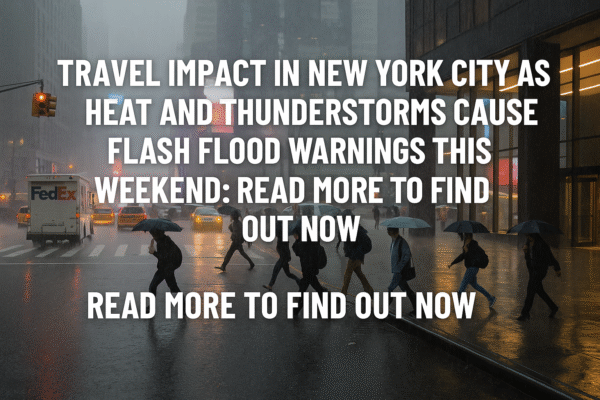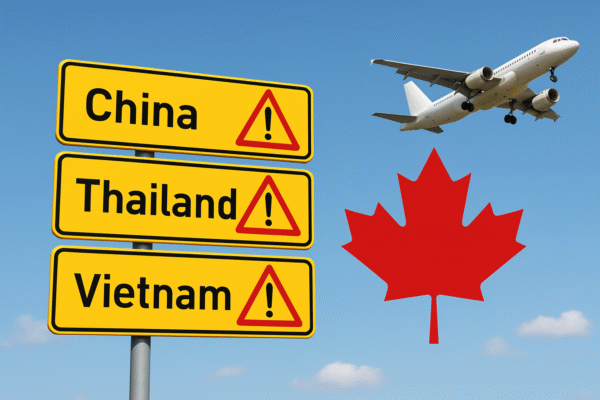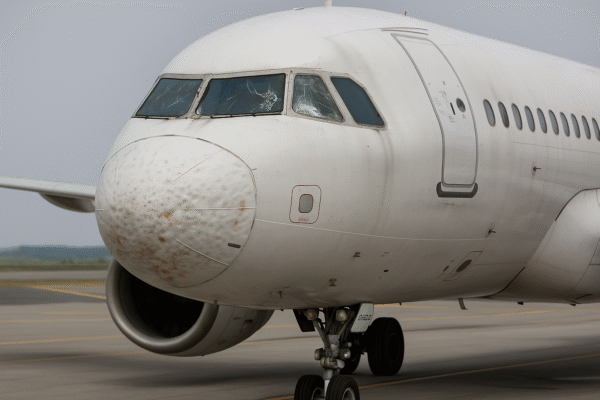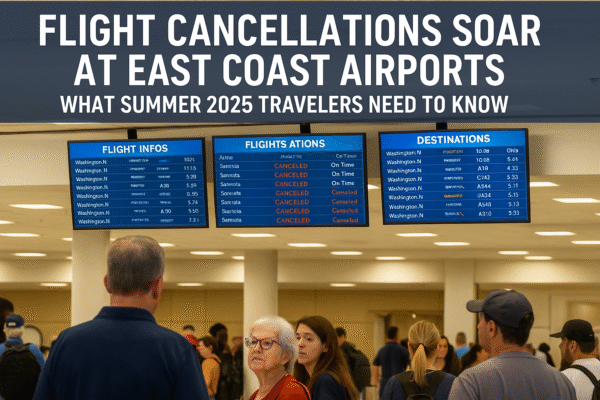Flight Cancellations Soar at East Coast Airports: What Summer 2025 Travelers Need to Know
If you’re flying through major East Coast airports this summer, brace yourself—flight cancellations are rising sharply, and your travel plans might be at risk. A combination of severe weather events, air traffic control staffing shortages, and limited airspace capacity has contributed to unprecedented disruption levels at U.S. airports, especially from Washington to Boston.
Summer 2025: A Season of Travel Disruption
According to the latest data from the Bureau of Transportation Statistics (BTS), North America experienced a 32% year-over-year increase in flight cancellations during June 2025. Independent aviation analytics firm Cirium also reports that the U.S. airline cancellation rate rose from 1.4% in summer 2024 to 1.8% in 2025—representing a 29% jump.
But the most alarming spikes are occurring at East Coast airports. Ronald Reagan Washington National Airport (DCA) saw a staggering 274% increase in cancellations. Hartsfield-Jackson Atlanta International (ATL) wasn’t far behind with a 257% rise. Meanwhile, Washington Dulles (IAD), Boston Logan (BOS), and New York’s LaGuardia (LGA) reported increases ranging from 65% to over 100%.
This geographic clustering of disruptions highlights a systemic breakdown in air travel reliability along one of the country’s busiest travel corridors.
Causes: Beyond Bad Weather
While severe thunderstorms and flash flooding are increasingly common during East Coast summers—especially with climate change intensifying weather volatility—these are only part of the story.
The Federal Aviation Administration (FAA) has cited critical staffing shortages at air traffic control (ATC) centers in the New York and Washington, D.C. areas as a primary factor. In fact, the FAA requested that airlines reduce scheduled flights by up to 10% this summer to prevent the system from being overwhelmed.
Ironically, this reduction in scheduling has had an unintended consequence: it creates fewer options for rerouting passengers during weather delays or cancellations, amplifying overall disruption. When fewer flights are in operation, every cancellation causes a domino effect.
Airline Performance: Who’s Coping Best?
Travelers can still make smart choices. According to Cirium’s 2025 airline performance data, Southwest Airlines reported the lowest cancellation rate in North America at just 0.62%, compared to the industry average of 1.63%. Delta Air Lines, Air Canada, and Spirit Airlines also ranked among the most reliable carriers this summer.
Flying earlier in the day may also help. According to the Department of Transportation (DOT), morning flights are statistically less likely to be delayed due to a cascading schedule backlog. Booking flights between 6 a.m. and 10 a.m. may help avoid the afternoon congestion and associated delays.
Additionally, using flight-tracking apps and subscribing to real-time airline alerts can be critical tools for proactive travel planning.
Impact on East Coast Tourism and Local Economies
Tourism-reliant cities like Washington D.C., New York, and Boston are particularly vulnerable to these disruptions. From the Smithsonian museums and the National Mall to the Freedom Trail and Cape Cod’s beach resorts, these destinations rely on a steady influx of domestic and international visitors.
Hotels, tour operators, car rental agencies, and local businesses are already reporting declines in visitor numbers. In Boston, the Greater Boston Convention & Visitors Bureau warned of a “weaker-than-expected” summer season if cancellation rates persist into August.
Similarly, Destination DC, the city’s official tourism arm, noted that travel disruptions are reducing last-minute bookings, particularly from families and short-stay visitors who are less likely to rebook after cancellations.
Know Your Rights: What the DOT Requires
Travelers impacted by cancellations have legal protections. According to the U.S. Department of Transportation, passengers are entitled to a full refund—not just a travel credit—if their flight is canceled for any reason, including weather or operational failure.
Airlines are also obligated to rebook you on the next available flight without additional fees. To empower travelers, the DOT offers helpful online resources including:
- The Air Travel Consumer Report, which publishes airline reliability stats
- FlightRights.gov, which outlines your rights in cases of cancellation or delay
These tools can help travelers hold airlines accountable and ensure they receive compensation or alternatives when plans go awry.
Looking Ahead: Can the FAA and Airlines Respond?
The current crisis is fueling pressure on both airlines and government agencies to find long-term solutions. The FAA has pledged to accelerate hiring and training of air traffic controllers, but staffing bottlenecks take months—if not years—to resolve. Meanwhile, airlines are under pressure to invest in better predictive technologies and more resilient scheduling systems.
Some carriers have already responded. After a notorious operational meltdown in late 2022, Southwest Airlines overhauled its winter and summer preparedness strategy, leading to improved performance in 2025.
Final Thoughts: Prepare, Protect, and Stay Flexible
Traveling through the East Coast this summer requires extra vigilance. With systemic issues unlikely to resolve overnight, flexibility, planning, and awareness are essential.
- Book early flights
- Choose reliable carriers
- Know your rights
- Monitor weather and air traffic news
Summer skies over the East Coast may look bright, but behind the scenes, storm clouds still loom. Stay informed, stay prepared—and travel smarter.
For more travel news like this, keep reading Global Travel Wire






















